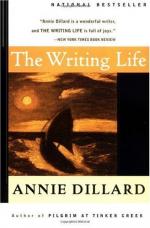
|
| Name: _________________________ | Period: ___________________ |
This test consists of 5 multiple choice questions, 5 short answer questions, and 10 short essay questions.
Multiple Choice Questions
1. How do Tibetan lamas keep from floating away, as described in Chapter 5?
(a) The meditate towards the destination.
(b) They wear chains.
(c) They walk very slowly.
(d) They swim with the current.
2. What was Dillard's painter neighbor, Glenn, working on for six months in Chapter 6?
(a) Landscapes painted by dripping paint on canvas.
(b) Painting over marbleized papers.
(c) Dipping papers into vats of colored oil on water.
(d) Folded sculpture.
3. What did a Dinka believe his own memories and daydreams to be?
(a) Psychologically important.
(b) The meaning of life.
(c) External to himself.
(d) An extension of himself.
4. Which poem did Dillard often read aloud?
(a) The Comet.
(b) The Tower.
(c) Miracles.
(d) Sea Hollly.
5. What question did Dillard ask Glenn that he answered with the story of Ferrar?
(a) What the weather was like now.
(b) How far it was to Fishery Point.
(c) How the waters were.
(d) How his work was going.
Short Answer Questions
1. How did Dillard come to understand the proper way to split wood?
2. How does Dillard say that she defines the life of the writer in Chapter 3?
3. How long does the twilight linger on the island on Haro Strait in June and July?
4. How did a well-known writer respond to a student in Chapter 5 who asked if he could be a writer?
5. What did Dillard do when she was upstairs in a house and she felt a tremor under her feet in Chapter 4?
Short Essay Questions
1. How does Dillard say that she believes a writer must control his or her own energies in order to work?
2. What is ludicrous about the tea kettle in the faculty lounge of the university that Dillard wrote in?
3. In Chapter 5, how does Dillard compare a writer to a tennis player?
4. Who was Paul Glenn?
5. What did Dillard learn from the local ferryman?
6. Why does Dillard compare a writer writing a first draft to a Zulu warrior and an Aztec maiden?
7. Why does Dillard say it makes more sense to write one big book than to write many stories or essays?
8. What does Dillard mean in Chapter 5 when she writes, '...instead we watch television and miss the show'?
9. Why does Dillard advise writers not to hoard a good idea for a later place in a book being written or for another book?
10. The next-to-last sentence of Chapter 5 reads, 'Shall we go rowing again, we who believe we may indeed row off the edge and fall?' What does this refer to?
|
This section contains 1,114 words (approx. 4 pages at 300 words per page) |

|




